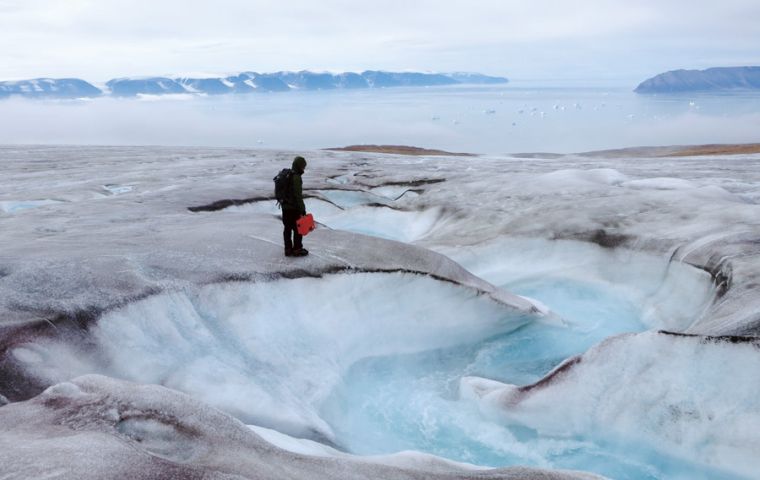MercoPress. South Atlantic News Agency
Most unusual temperatures recorded in Antarctica
 It most likely was a random event, but if it happens again it could mean global warming
It most likely was a random event, but if it happens again it could mean global warming Meteorologists have registered rare temperatures in Antarctica 30 degrees Celsius above usual figures, which had last been recorded in 1991. Scientists believe that should this situation persist, it would be a clear sign of climate change.
This past nearing-equinox week, East Antarctica researchers recorded temperatures of more than 30 degrees above normal, which some experts considered to be an “absolute record,” although the French National Meteorological Service (SMNF) recalled that consecutive frost-free days had last occurred in 1991.
Last Friday, the French-Italian research base Concordia in dome C of the Antarctic plateau at an altitude of more than 3,000 meters ASL, recorded a temperature of 11.5°C below zero, which they considered “an absolute record for all months combined, surpassing the 13.7°C below zero of December 17, 2016,″ according to SMNF's Etienne Kapikian.
With the end of the southern hemisphere's summer, temperatures should have dropped. However, the Dumont d'Urville base, located on the coast of Terre Adélie, set the record for the mildest March on Friday, with +4.9°C, and a minimum temperature of +0.2°C.
Meteorologist Gaëtan Heymes argued: ”Frost-free days are occasional in Dumont d'Urville, but they had never occurred after February 22, 1991.″ He added that there was a “historically mild event over the east,” with temperatures of 30 to 35°C above seasonal parameters.
University of Wisconsin meteorologist Matthew Lazzara warned that the rising temperatures were “not a good sign when you see that kind of thing happening.” The researcher, who is in charge of monitoring temperatures at East Antarctica's Dome C-ii, registered -10°C Friday, when normal is -43 degrees Celsius. “That's a temperature you should see in January, not March. January is summer there. That's dramatic,” he stressed.
Walt Meier, a scientist at the National Snow and Ice Data Center in Boulder, Colorado, agreed with Lazzara: these temperatures were most likely a random event, but both researchers believed that if it happens again it could be signaling global warming.



Top Comments
Disclaimer & comment rulesCommenting for this story is now closed.
If you have a Facebook account, become a fan and comment on our Facebook Page!